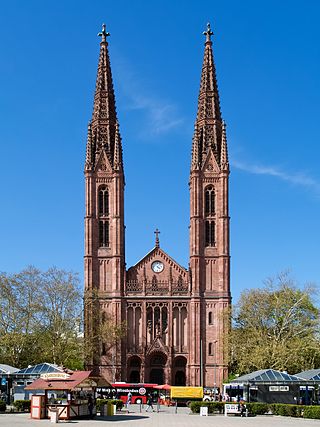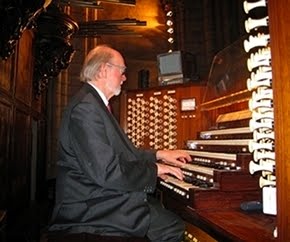
Queen of Heaven is a title given to the Virgin Mary, by Christians mainly of the Catholic Church and, to a lesser extent, in Anglicanism, Lutheranism, and Eastern Orthodoxy. The title has long been a tradition, included in prayers and devotional literature and seen in Western art in the subject of the Coronation of the Virgin from the High Middle Ages, long before it was given a formal definition status by the Church.
Naji Subhy Paul Irénée Hakim is a Franco-Lebanese organist, composer, and improviser.

The "Salve Regina", also known as the "Hail Holy Queen", is a Marian hymn and one of four Marian antiphons sung at different seasons within the Christian liturgical calendar of the Catholic Church. The Salve Regina is traditionally sung at Compline in the time from the Saturday before Trinity Sunday until the Friday before the first Sunday of Advent. The Hail Holy Queen is also the final prayer of the Rosary.

Marian hymns are Christian songs focused on Mary, mother of Jesus. They are used in both devotional and liturgical services, particularly by the Roman Catholic, Eastern Orthodox, Oriental Orthodox, Anglican, and Lutheran churches. They are often used in the month of May devotions. Some have also been adopted as Christmas hymns. Marian hymns are not popular among some Protestants, as they see Marian veneration as idolatry. However, the practice is very common among Christians of Catholic traditions, and a key component of the Eastern Orthodox liturgy. There are many more hymns to Mary within the Eastern Orthodox yearly cycle of liturgy than in Roman Catholic liturgy.

"Alma Redemptoris Mater" is a Marian hymn, written in Latin hexameter, and one of four seasonal liturgical Marian antiphons sung at the end of the office of Compline.

Olivier Jean-Claude Latry is a French organist, improviser, and composer. He is professor of organ in the Conservatoire de Paris.

Panis angelicus is the penultimate stanza of the hymn "Sacris solemniis" written by Saint Thomas Aquinas for the feast of Corpus Christi as part of a complete liturgy of the feast, including prayers for the Mass and the Liturgy of the Hours.
After the liturgical reforms of Vatican II, Pope Paul VI presented a 1974 document as a "minimum repertoire of Gregorian chant", which the faithful should learn to sing. In promulgating the booklet, the Congregation for Divine Worship stated that the book would be "extremely useful if the faithful learn the chants contained in the volume, as the Pope and the Congregation for Divine Worship intend."
Peeter Cornet was a Flemish composer and organist of the early Baroque period. Although few of his compositions survive, he is widely considered one of the best keyboard composers of the early 17th century.

Catholic Marian music shares a trait with some other forms of Christian music in adding another emotional dimension to the process of veneration and in being used in various Marian ceremonies and feasts. Marian music is now an inherent element in many aspects of the veneration of the Blessed Virgin Mary in Catholic Mariology.

St. Bonifatius in Wiesbaden, Germany, is the central Catholic parish and church in the capital of Hesse. The present building was designed by architect Philipp Hoffmann in Gothic Revival style and built from 1844 to 1849. Its twin steeples of 68 m (223 ft.) dominate the Luisenplatz. The parish is part of the Diocese of Limburg.

Thierry Joseph-Louis Escaich is a French organist and composer.

Jean-Pierre Leguay is a French organist, composer and improviser. He studied with André Marchal, Gaston Litaize, Rolande Falcinelli (organ), Simone Plé-Caussade (counterpoint), and Olivier Messiaen (composition), before serving as titular organist at Notre-Dame-des-Champs, Paris from 1961 to 1984. In 1985 he was named a titular organist at the Cathedral of Notre-Dame de Paris, alongside Olivier Latry, Yves Devernay and Philippe Lefebvre. He held this position through the end of 2015, and is now titular organist emeritus.

Jean-Baptiste Robin is a French composer and organist.

Salve Regina is a Marian anthem, a setting by Arvo Pärt of the Latin hymn "Salve Regina" for mixed choir and organ in 2001. It was first performed in Essen Cathedral on 22 May 2002. It was published by Universal Edition in 2002. Pärt arranged the composition for choir, celesta and string orchestra in 2011 for a celebration of 150 years of Italian unity.
Jean-Marie Plum was a Belgian composer and organist.
Auguste Joseph-Marie François Le Guennant was a French organist, church musician and composer. He was, after positions as organist and head of the chapel in Paris and Nantes, the director and teacher at the Gregorian Institute of Paris, as a specialist of Gregorian chant.
Pierre Camonin was a French organist, composer and improviser.

Faith of Our Fathers is a compilation album of traditional Catholic/Christian English, Irish, and Latin hymns recorded by Irish artists in 1996.
Dom Gregory Murray OSB was a British monk of Downside Abbey, and an organist and composer. His over-riding interest as a musician was to provide music that would enhance the Roman Catholic liturgy.













